The global cycle of consumerism has become an insidious force, leaving behind a trail of waste that disproportionately burdens developing nations. At the core of this issue lies the deliberate failure of multinational corporations to account for the end-of-life management of their products. Consequently, countries like Nigeria have become dumping grounds for discarded vehicles, refrigerators, air conditioners, freezers, washing machines, televisions, mobile phones, laptops, batteries, plastic packaging, non-biodegradable textiles, medical equipment, and even outdated solar panels.
These relics of global consumerism, often labeled as “used” or “refurbished” goods, frequently arrive in Nigeria in unusable conditions or with lifespans so short that they are barely worth the cost of their transport. What initially appears to be an affordable solution for Nigerian consumers rapidly devolves into an environmental and public health catastrophe. Nigeria’s cities and rural landscapes are increasingly marred by mountains of electronic waste and other discarded products. In urban centers such as Lagos, Ibadan, and Kano, the informal recycling of e-waste has become commonplace. This unregulated process releases hazardous substances like lead, mercury, cadmium, and brominated flame retardants into the air, soil, and water, posing severe risks to both the environment and human health.
Beyond electronics, discarded vehicles and industrial machinery present another formidable challenge. Worn-out tires, corroded batteries, and used oil filters accumulate in landfills or are burned in open spaces, releasing noxious fumes and exacerbating air pollution. Household appliances like refrigerators and air conditioners, when improperly disposed of, emit chlorofluorocarbons (CFCs) and hydrofluorocarbons (HFCs), intensifying global warming and harming the ozone layer. These pollutants strain Nigeria’s already overwhelmed waste management systems, diverting resources from other critical infrastructure needs. Moreover, the influx of substandard imports undermines the development of local industries, stifling innovation and job creation while discouraging investments in sustainable manufacturing and recycling solutions.
The human toll of this crisis is equally alarming. Informal workers tasked with dismantling discarded products face daily exposure to harmful toxins, often without adequate protective gear or knowledge of the risks. Heavy metals leaching into water supplies lead to increased rates of neurological disorders, respiratory illnesses, and cancers, particularly in vulnerable communities. Coastal regions are not spared either, as the unchecked dumping of marine pollutants depletes fish stocks, threatening the livelihoods of fishermen and the food security of countless Nigerians. Children are perhaps the most vulnerable, with studies showing that exposure to toxins from improperly handled waste severely impairs cognitive development, reduces life expectancy, and perpetuates the cycle of poverty.
While much of the blame lies with exporting nations and their corporations, Nigeria’s lack of stringent regulations and enforcement mechanisms has exacerbated the problem. The Basel Convention, which seeks to regulate the transboundary movement of hazardous waste, is routinely violated as ships laden with non-functional goods enter Nigerian ports under the guise of “charitable donations” or “economic aid.” Yet it would be shortsighted to focus solely on external actors. Nigeria’s own policies and practices must be scrutinised and reformed to address this growing crisis.
The Nigerian government must act with urgency to stem the tide of waste and safeguard the country’s future. Stronger import restrictions are needed to ban the entry of second-hand goods that do not meet minimum quality and lifespan standards. Our ports must be equipped with thorough inspection protocols to prevent the influx of waste disguised as usable products. Equally important is the development of a robust waste management infrastructure, including formal recycling facilities capable of safely processing hazardous materials. Encouraging partnerships with private sector players will be essential in creating efficient systems for waste collection and processing.
Producers must also be held accountable for the environmental costs of their products. Nigeria should adopt an Extended Producer Responsibility (EPR) framework that mandates companies exporting goods to Nigeria to include clear end-of-life management plans. Public awareness campaigns can complement these measures by educating citizens on the dangers of substandard goods and improper disposal, while incentivising the purchase of locally manufactured, sustainable alternatives. Furthermore, Nigeria must strengthen its position on the international stage, holding exporting nations accountable under the Basel Convention and negotiating stricter bilateral agreements to curb the flow of hazardous imports.
At the same time, Nigeria must focus on nurturing its local industries. Supporting the growth of domestic manufacturing and recycling sectors through subsidies, grants, and tax incentives will reduce the country’s dependency on imports while generating employment opportunities. Such initiatives would also foster innovation and help Nigeria transition to a more sustainable economic model.
If Nigeria continues to absorb the world’s waste without instituting safeguards, the consequences will be catastrophic—environmentally, economically, and socially. The country cannot afford to remain a passive participant in the global economy. Bold, decisive action is required to reclaim its sovereignty, protect its environment, and ensure a future where its citizens can thrive. The Nigerian government must rise to the occasion, addressing this crisis with the seriousness and urgency it demands.

